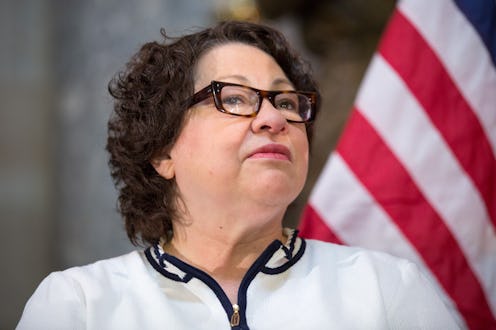News
Sonia Sotomayor's Yearbook "Scandal" Couldn't Be More Different Than Kavanaugh's

Earlier this month, SCOTUS nominee Brett Kavanaugh's high school yearbook page drew much attention, as it appeared to make repeated references to drinking, among other controversial topics. Recently, photos of another judge's yearbook page have also made their way around social media. Supreme Court Justice Sonia Sotomayor also had a yearbook "scandal" during her confirmation process, but the reason why is worlds apart from the buzz surrounding Kavanaugh's page.
Justice Sotomayor attended Princeton University in Princeton, New Jersey, graduating summa cum laude with a degree in history in 1976. Princeton's Alumni Weekly magazine characterized Sotomayor as excelling at college, both in academics and outside of the classroom. The outlet noted that, during her time at the university, Sotomayor was a founder of the Latino Student Organization. She also was part of a group of Puerto Rican and Chicano students who launched a complaint with the Department of Health, Education, and Welfare in 1974 to allege that the university was engaging in discriminatory practices.
A Princeton yearbook entry featuring Sotomayor reveals the lasting positive impression the university made on the now-SCOTUS justice. Following a quote from Norman Thomas about the power of championing causes, a caption next to Sotomayor's photo highlights the admiration she had for those she met while studying at Princeton:
My Princeton experience has been the people I've met. To them, for their lessons of life, I remain eternally indebted and appreciative. To them and to that extra-special person in my life. Thank You — for all that I am and am not. The sum of my total life here has been made-up of little parts from all of you.
Notably, the scandal surrounding Sotomayor's yearbook page stemmed from the aforementioned Thomas quote she included in her entry. Thomas was a six-time presidential candidate who ran as a member of the Socialist Party. Sotomayor's inclusion of Thomas' quote did not necessarily draw widespread condemnation, though it was something criticized by some conservative individuals and organizations during her nomination process.
Sotomayor's eloquent words about the value of her college experience —and her relatively minor "scandal" — stand in contrast to the sentiments reflected on Kavanaugh's yearbook page. Kavanaugh attended Georgetown Preparatory School school in Maryland, graduating with his high school diploma in 1983. According to Vox, Kavanaugh's yearbook page, which is composed of a variety of short statements, seems to make repeated references to drinking and partying.
For example, the outlet noted that the phrase "Summer of ‘82 — Total Spins (Rehobeth 10, 9...)" perhaps could imply that the now-SCOTUS nominee enjoyed a host of drinking activities during this time period. Moreover, the phrase "Keg City Club (Treasurer) — 100 Kegs Or Bust” — directly references alcohol. Indeed, according to a passage from Kavanaugh's friend Mark Judge's memoir, the "100 kegs" notion reflects the group's desire to consume 100 kegs of beer before graduating from high school.
Kavanaugh has implied that he may have drank alcohol in high school, saying during an interview on Fox News on Sept. 24, "People might have had too many beers on occasion and people generally in high school — I think all of us have probably done things we look back on in high school and regret or cringe a bit.” However, according to Business Insider, during his SCOTUS confirmation hearings he characterized the phrases on his yearbook page as nothing more than jokes.
While Kavanaugh may interpret his yearbook page differently than some members of the public, it is nonetheless clear that his page presents a vastly different image than that of Justice Sotomayor's. While Kavanaugh was comparatively younger than Sotomayor when his page was published, the difference between the two entries still offers insight into each individual's past — and how they perceived their childhood, young adulthood, and education.